
Journal of Information Policy
Scope & Guideline
Navigating the Complexities of Information Policy
Introduction
Aims and Scopes
- Information Infrastructure Development:
The journal explores frameworks and policies that support the growth and sustainability of information infrastructure, particularly in relation to local and national contexts. - Spectrum Management and Policy:
It addresses issues surrounding spectrum rights, usage, and management, highlighting the importance of equitable access to digital resources. - Impact of Technology on Society:
The journal examines how emerging technologies, such as 5G and smart technology, affect social dynamics, economic structures, and individual rights. - Cybersecurity and Privacy:
Research published in the journal often delves into cybersecurity challenges, privacy policies, and the ethical implications of data management. - Digital Divide and Access Issues:
A significant focus is placed on the disparities in access to digital resources, particularly in rural and underserved communities. - Regulatory Frameworks and Governance:
The journal discusses various regulatory approaches, including the implications of international policies and standards on local practices.
Trending and Emerging
- Digital Equity and Infrastructure Policy:
There is an increasing focus on policies aimed at ensuring equitable access to digital infrastructure, particularly in underserved communities, reflecting a growing recognition of the digital divide. - Spectrum Policy Innovations:
Recent papers delve into innovative spectrum management strategies, particularly in the context of new technologies like 5G, showcasing the importance of adapting policies to emerging technological realities. - Cybersecurity in Remote Work Environments:
The rise of remote work due to the COVID-19 pandemic has led to an increased emphasis on cybersecurity challenges, with research exploring the impacts of home working on information security. - Impact of COVID-19 on Information Technology:
The pandemic has catalyzed a wave of research examining how COVID-19 has transformed information technology use and perceptions, particularly regarding broadband access and digital communication. - Indigenous Engagement in Broadband Policy:
Emerging studies focus on the unique challenges and opportunities for Indigenous communities in broadband access, emphasizing the need for culturally sensitive policy approaches.
Declining or Waning
- Traditional Copyright Issues:
Research focusing solely on traditional copyright concerns has decreased, possibly due to the growing complexity of intellectual property in the digital age and the rise of new forms of content creation. - General Internet Use and Performance Studies:
While still relevant, studies that broadly analyze internet use without specific contextual frameworks or implications have become less frequent, indicating a shift towards more targeted research. - E-Waste Management Practices:
The focus on e-waste management at the university level has waned, suggesting a possible shift towards more pressing issues related to digital sustainability and broader environmental impacts. - Comparative Analysis of Internet Policies:
Papers comparing internet policies across different nations have diminished, perhaps as researchers concentrate on more localized or specific policy impacts. - Social Media Ethics:
While corporate ethics related to social media were once prominent, there seems to be a decline in publications directly addressing ethical considerations, as the field matures and becomes more nuanced.
Similar Journals

RDBCI-Revista Digital de Biblioteconomia e Ciencia da Informacao
Championing high-quality research for a global audience.RDBCI-Revista Digital de Biblioteconomia e Ciencia da Informacao, published by the esteemed Universidade Estadual de Campinas, is a premier Open Access journal dedicated to advancing the fields of Library and Information Science, Education, and Public Administration. Since its inception in 2003, this multidisciplinary journal has aimed to provide a platform for high-quality research and discourse, contributing to the academic community both in Brazil and globally. With the E-ISSN 1678-765X, the journal addresses contemporary issues and innovations in information management, ensuring accessibility to a diverse audience. RDBCI holds a respectable position among its peers, boasting a Q3 ranking in Library and Information Sciences and various Q4 classifications in Education and Information Systems as of 2023. Scholars and practitioners are encouraged to submit their work, engage with research trends, and explore significant advancements in the discipline through this vital source of knowledge.

EUROPEAN JOURNAL OF INFORMATION SYSTEMS
Cultivating Thought Leadership in Information ManagementThe EUROPEAN JOURNAL OF INFORMATION SYSTEMS, published by Taylor & Francis Ltd, stands as a premier platform for groundbreaking research in the domains of Information Systems and Management. With an ISSN of 0960-085X and E-ISSN 1476-9344, this esteemed journal has been at the forefront of academic discourse since its inception in 1995, converging insights and innovative methodologies that reflect the dynamic landscape of information technology. Recognized for its excellence, the journal achieved a Q1 ranking across multiple categories in 2023, including Information Systems and Library & Information Sciences, underscoring its vital role in shaping contemporary research. Operating from the UK, the journal fosters an engaging scholarly community while offering researchers and practitioners insights that drive both theoretical advancement and practical application. Although it does not currently provide open access options, the journal's reputation for high-impact content makes it an essential resource for those who strive to advance the field. With an enduring commitment to quality, the EUROPEAN JOURNAL OF INFORMATION SYSTEMS continues to inform, inspire, and connect the next generation of scholars and professionals.
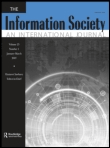
INFORMATION SOCIETY
Transforming Understanding of Information's Role in SocietyINFORMATION SOCIETY, published by Taylor & Francis Inc, stands at the forefront of interdisciplinary inquiry, bridging the realms of cultural studies, information systems, and political science since its inception in 1981. With a commendable impact factor and recognized as a Q1 journal in multiple categories, including Cultural Studies and Management Information Systems, it serves as a pivotal platform for researchers, professionals, and students seeking insights into the ever-evolving dynamics of information in society. The journal, indexed by Scopus and ranked highly in various disciplines, not only highlights key theoretical developments but also addresses applied practices in information management within cultural and political contexts. While access is subscription-based, the journal’s impact and relevance ensure it remains essential reading for those engaged in the critical exploration of information's role in contemporary and future societies.
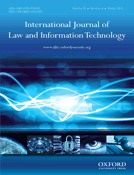
International Journal of Law and Information Technology
Transforming Legal Perspectives through Technological Insights.The International Journal of Law and Information Technology, published by Oxford University Press, stands as a leading forum for the exploration of the evolving intersection between law and information technology. With its ISSN 0967-0769 and E-ISSN 1464-3693, this esteemed journal has been at the forefront of academic discourse since its inception in 1993 and is poised to continue influencing the landscape of legal scholarship and information sciences until at least 2024. With a prestigious categorization in the Q2 quartile for both Law and Library and Information Sciences, the journal is prominently ranked in the 76th and 64th percentiles respectively within Scopus rankings. Offering insights on vital themes such as privacy, intellectual property, and technological regulation, the International Journal of Law and Information Technology provides a valuable resource for researchers, practitioners, and students alike, facilitating a deeper understanding of the legal challenges and opportunities presented by technological advancements. While not an open-access publication, the rigorous peer-reviewed articles serve to enrich the global academic community’s knowledge in this critical and dynamic field.
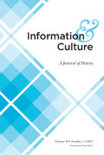
Information & Culture
Advancing Scholarship in Information and ConservationInformation & Culture is a respected journal published by University of Texas Press, focusing on the rich intersections between conservation, history, and library and information sciences. With a robust E-ISSN of 2166-3033, this journal has established itself as a vital resource for researchers, professionals, and students alike, providing a platform for innovative scholarship since its inception in 2012. The journal has garnered admirable rankings, achieving a Q2 category in both Conservation and History, alongside a Q3 ranking in Library and Information Sciences, reflecting its quality and relevance in the academic community. Its placement within the Scopus rankings further highlights its significance, with notable positions in the 79th percentile for Arts and Humanities and the 63rd percentile for Conservation. As a testament to its commitment to accessible knowledge, the journal offers various access options, catering to a wide audience eager to explore the evolving landscape of information and cultural studies.

INFORMATION TECHNOLOGY AND LIBRARIES
Transforming Library Practices with Innovative Tech Solutions.INFORMATION TECHNOLOGY AND LIBRARIES, published by the American Library Association, stands as a crucial resource in the ever-evolving intersection of information technology and library sciences. With an ISSN of 0730-9295 and an E-ISSN of 2163-5226, this open access journal has been dedicated to fostering the dissemination of innovative research since its inception in 1971. Currently enjoying a Q2 ranking in both Information Systems and Library and Information Sciences, it is well-regarded within the scholarly community, reflecting its commitment to high-quality research outputs. The journal's diversified content scope—and a robust ranking of #80 out of 280 in the Library and Information Sciences category on Scopus—positions it as a pivotal platform for researchers, practitioners, and students alike. With the journals' emphasis on bridging technological advancements and library practices, it remains an essential tool for anyone looking to stay informed and engaged in these dynamic fields.

African Journal of Library Archives and Information Science
Empowering Knowledge, Transforming Libraries.The African Journal of Library Archives and Information Science (ISSN: 0795-4778; E-ISSN: 0795-4778) is a pivotal publication in the field of Library and Information Sciences, published by ARCHLIB & INFORMATION SERVICES LTD in Nigeria. With a focus on the diverse and evolving challenges faced by libraries and information professionals in the African context, this journal serves as a platform for scholarly communication, fostering innovation and collaboration among researchers, practitioners, and academics. The journal has a notable impact factor, reflected in its Q3 ranking within the category for 2023, and is indexed in Scopus, holding a percentile rank of 22nd in its field, further validating its relevance and scholarly contribution. Running since 2008 with continual publications through to 2024, the journal aims to advance knowledge, share best practices, and highlight emerging trends in librarianship and information science across Africa and beyond. By offering open access options, it ensures wide dissemination of knowledge, making it an essential resource for those dedicated to enhancing information services and archives.

Annals of Library and Information Studies
Advancing Knowledge in Library and Information SciencesAnnals of Library and Information Studies is a prominent open-access journal, published by NATL INST SCIENCE COMMUNICATION-NISCAIR in India, dedicated to advancing research in the fields of library science and information studies. With an ISSN of 0972-5423 and an E-ISSN of 0975-2404, this journal ensures broad accessibility, having embraced open access since 2009, facilitating the dissemination of knowledge to a diverse global audience. The journal features a comprehensive range of scholarly articles that explore innovative practices, emerging technologies, and significant trends influencing library and information science, which are crucial for professionals, researchers, and students alike. Additionally, it holds a respectable ranking in Scopus, positioned at the 54th percentile in Library and Information Sciences and 22nd percentile in Computer Science Applications, underscoring its relevance and impact within these disciplines. The Converged Years of 2011 to 2024 illustrate a commitment to publishing contemporary research. As the realm of information continues to evolve rapidly, the Annals of Library and Information Studies serves as an essential platform for fostering dialogue and knowledge exchange, solidifying its role as a vital resource for the academic community.
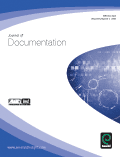
JOURNAL OF DOCUMENTATION
Unveiling Cutting-edge Research for Tomorrow's Information Systems.JOURNAL OF DOCUMENTATION is a premier academic journal published by Emerald Group Publishing Ltd, dedicated to advancing knowledge in the fields of Information Systems and Library and Information Sciences. With an enduring legacy since its inception in 1945, this journal has established itself as a pivotal resource for researchers, professionals, and students alike, providing cutting-edge insights and comprehensive research findings relevant to the ever-evolving landscape of information management. The journal boasts a commendable impact factor and has been ranked in the Q2 category for Information Systems and Q1 for Library and Information Sciences as of 2023, reflecting its significant contribution to these fields. It is indexed in Scopus, with notable rankings in the Social Sciences and Computer Science categories, ensuring visibility and accessibility for the academic community. While the journal currently does not offer open access, it remains committed to disseminating high-quality research that informs practice and stimulates scholarly discussion locally and globally, making it a valuable asset for anyone invested in the study of documentation and information processes.
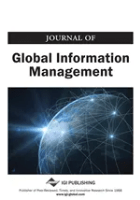
Journal of Global Information Management
Uncovering Trends in Business and Information TechnologyWelcome to the Journal of Global Information Management, a premier academic publication dedicated to advancing the fields of Business, Information Systems, Computer Science, and Management. Published by IGI Global, this esteemed journal holds a remarkable position in the academic community, boasting a Q1 ranking in Business and International Management and consistent Q2 standings across a variety of related disciplines, including E-learning and Strategy and Management. With an established publication period from 2002 to 2024, this journal serves as a critical platform for researchers, practitioners, and students eager to share innovative insights and contribute to knowledge formation in a rapidly evolving global environment. The journal emphasizes rigorous research and theoretical advancements, ensuring valuable contributions that enhance the understanding and application of information management across diverse sectors. Join us on this journey to explore and refine the practices that shape our digital and knowledge-centric world.